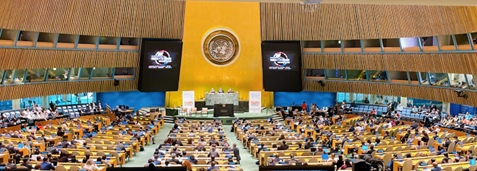Milestone for the SDGs
2023.10.06
-

- Matsuyama Takeshi Senior Director Operations Strategy Department
SDGs were adopted in 2015 and we are at the halfway point to the target year 2030. The quadrennial SDG Summit was held in September at the United Nations, where heads of state discussed how to accelerate the implementation of the SDGs. Besides, in Japan the Development Cooperation Charter was revised in June, clearly stating strengthening efforts toward the SDGs. We could say that the year 2023 is a milestone for the SDGs.
Progress on the SDGs has been slow. The United Nations mentions "the world is falling short of meeting most of the Goals by 2030. While certain areas have witnessed progress, there remains a concerning proportion of targets that are either progressing too slowly or regressing. " (The Sustainable Development Goals Report Special edition 2023), and " A preliminary assessment of the roughly 140 targets for which data is available shows that only about 12 per cent are on track; more than half, although showing some progress, are moderately or severely off track; and some 30 per cent have either seen no movement or regressed below the 2015 baseline.”(SDG Progress Report Special Edition.pdf (un.org)
)
The number of armed conflicts in the world is the highest since 1945, and the number of refugees and displaced persons in the world is the highest in history, exceeding 110 million. Soaring food and energy prices have had a particularly heavy impact on developing countries, and an increasing number of countries are plunging into debt crises. It is becoming increasingly difficult to "leave no one behind”.
The delay is caused by a "compounding crisis," where multiple challenges including the COVID-19 pandemic, climate change, conflicts, and others have become interconnected, leading to this situation. These crises have significant global implications, including in Japan, but in particular, their impact on developing countries is severe.
Last July our staff member attended High-Level Political Forum, which is annually held to review the progress of the SDGs. It was announced that the funding gap required to achieve the SDGs has expanded from $2.5 trillion before the pandemic to $4.2 trillion, calling for a commitment to mobilize funds and further efforts. In the outcome document of the forum called “Political Declaration”, it was emphasized that scaling up the finance, transformation including utilization of science, and integration of SDGs into the policymaking are necessary to accelerate the achievement of SDGs, and called for commitment of toward 2030.

What should we do for going forward?
I think we should go back to the principles of the SDGs.
One of the principles is “comprehensiveness”. SDGs consist of 17 goals that encompass social, economic, and environmental objectives. I believe the
SDGs are sending a message that, we should have a broader perspective to connect different issues to solve them under the current situation where one
challenge interconnects others.
The other is "partnership". SDGs are not just goals for developing countries, but are global goals for everyone. The message encourages everyone to consider them as "our goals" and to leverage each other's strengths by working together.
JICA is recently focusing on "co-creation" by establishing the "JICA Global Agenda," strategies for twenty sectors as well as platforms to create a space for co-creation with knowledge and resources of various partners including private sectors, while setting goals and scenarios for solving social problems in developing countries.
When it comes to the platform activities, JICA serves as the secretariat of “the Sustainable Cacao Platform for Developing Countries”, to create a platform with private sectors and organizations to eradicate child labor that may occur in the chocolate production process, thereby contributing to the realization of a sustainable cacao industry.
In terms of promoting transformation or innovation, JICA supports startup companies that engage in social challenge-solving businesses. Through initiatives like "TSUBASA," JICA connects Japanese startup companies with counterparts in Central and South America. In the "Project NINJA", JICA encourages local startup companies in various African countries, resulting in the emergence of numerous budding businesses. During my assignment in Ethiopia, when I met young entrepreneurs supported by Project NINJA, I was impressed by their enthusiasm and their convincing speeches about wanting to use their technology to bring change to specific challenges within the country.
When it comes to "young people," the youth representatives had chances to speak at various sessions during the High Level Political Forum. One of them mentioned that they should not only be as "beneficiaries" but also as "contributors."
Furthermore, I have chances to talk about the SDGs to high school and university students in Japan, and I am always impressed by their awareness of social issues and their proactive actions. It is important to involve the "youth" and to co-create with them.
JICA encourages the youth to understand developing countries and SDGs. Recently, we published a book titled "JICA×SDGs" for middle and high school students in collaboration with Yamakawa Publishing. We also are involved in "2025 Osaka-Kansai World Expo," to establish connections between developing countries and many visitors , especially for children who will shape the future.
We hope that this milestone year would be an opportunity for people to consider global challenges as something personal and take small actions.
scroll